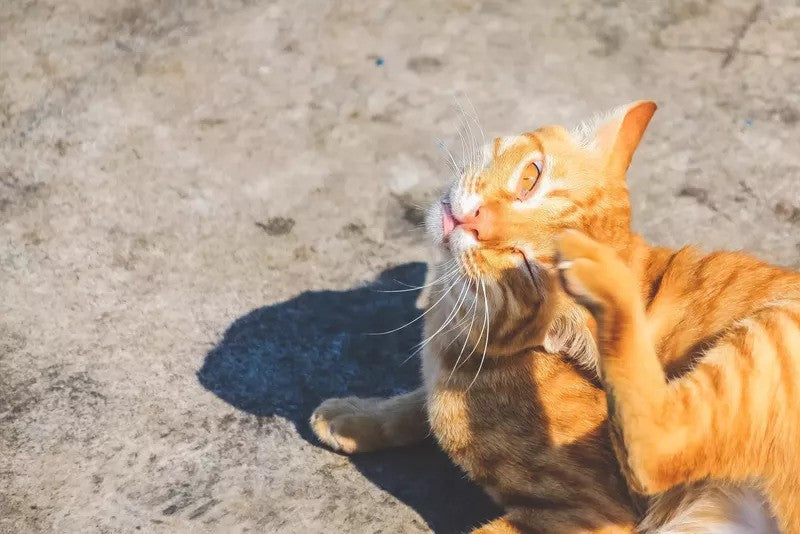Cats are graceful and independent companions, but they can also have health issues that need our attention. One common problem that cat parents may encounter is cat itchy ears.
In this guide, we will talk about itchy cat ears, along with its causes, symptoms, treatment, and prevention. Additionally, we will introduce products to help maintain and promote your furbaby’s ear health.
"Cats have very sensitive ears. This ear sensitivity often makes them prone to ear infections, allergies, and parasites."

The tell-tale signs are pretty obvious. Does your cat excessively shake their head or rub their ears against the furniture? Do they scratch it like their whole life depended on it? According to MSD Veterinary Manual, cats have very sensitive ears to both sound and touch. This ear sensitivity often makes them easy victims of ear infections, allergies, and parasites.
Itchy Cat Ears Signs and Symptoms
Recognizing the signs and symptoms of itchy cat ears is important for prevention and early treatment before it gets worse. Always keep an eye out for the following:
- cat scratching ears excessively
- redness in the ear flaps or ear canal
- ears appear to be painful that the cat won’t allow you to touch them near the area
- head tilting towards the affected ear
- frequent head-shaking
- ear discharge with a foul odor
- excessive ear wax buildup
- presence of blood in the ear discharge or ear canal
- disorientation
- sudden behavioral changes
- partial or complete hearing loss
Common Causes of Cat Itchy Ears
Infections
One of the most common causes of cat itchy ears are ear infections in cats. Since cat’s ears are very sensitive, cat ears are susceptible to infections. Infections in a cat's ears are caused by many factors like immune system diseases, irritants in the environment, foreign bodies in the ear canal, and excessive wax buildup. It can also be caused by genetics as some breeds are also more prone than others, like Persians and Himalayans.
If a cat ear infection has been recurring and left untreated, it can become life-threatening as the infection spreads from the outer part to the inner part of your furbaby’s ears. This may eventually result in hearing loss and disorientation.
Ear Mites
Ear mites can be another cause of cat scratching ears. Ear mites are very tiny parasites that are found in your furbaby’s ears where they live, breed, and multiply. Ear mites are highly transferable and will easily spread from one cat to another.
If your cat frequently comes in contact with other animals, by spending time in boarding facilities or exploring outdoors, it is important to keep a close eye out for ear mites as they can be easily passed on. Ear mites can also be transferred through contact with contaminated items, like brushes, beds and blankets. If you know your furbaby has come in contact with a contaminated pet or item, it’s a good idea to bring your cat into the vet for an examination.
Cats in shelters are also more likely to acquire ear mites. If you have recently rescued a cat, it is important they get inspected for eat mites. It is best to plan a routine exam with your vet immediately.
According to VCA Animal Hospitals, clinical signs of ear mites include a dark waxy discharge, a crusted rash around or in the ear, and areas of hair loss due to excessive scratching, pawing, or rubbing of the ears.
Allergies
Your cat may have itchy ears because of allergies. Your furbaby can be allergic to a lot of things, including mold, grass, dust, pollen, medication, and even food. Allergies can cause not only itchy ears but also irritate other parts of the body.
Foreign Bodies
Foreign bodies stuck inside your cat's ears may also cause cat scratching ears. Cats are adventurous creatures and sometimes can get into trouble. While spending their time outdoors, your furbaby may have caught a grass seed or a bug in their ears and this gets stuck in the ear canal. When not dislodged or removed immediately, it can easily irritate the susceptible tissues around the ears leading to an itching and uncomfortable situation.
How to Help With Cat Itchy Ears
There is no better way to help your furbaby than taking them to the vet. Your vet will run some tests on your cat and find out what is causing their ears to itch. It is important to note all the changes you have seen in your cat from the onset of the itching up to the present time. This will help your vet diagnose your cat and recommend the right treatment plans.
Treatment options your vet may recommend include the following:
For infections, your vet may administer antifungals or antibiotics depending on what type of ear infection your cat may have and what caused it. This may be prescribed for a minimum of 6-8 weeks.
For ear mites, your vet will recommend ear drops or spot-on treatments as they can be the easiest solution to your ear mites problem. These products also help aid your furbaby with pain, inflammation, and itchiness caused by ear mites.
For allergies, depending on what type of allergies may be causing your cat’s ears to itch, your vet may treat allergies with decongestants or antihistamines. If it is a food allergy, a change of diet may be necessary. If it is an environmental allergy, your furbaby’s exposure to a certain allergen must be reduced and their activities be restricted to not get in contact with it.
Remember, the treatment for cat itchy ears depends on what is causing it.
The Role of Pet WiPees™ in Cat Ear Care
Pet WiPees™ offers a variety of products that can help you and your furbaby deal with itchy cat ears.
Pet WiPees™ Ear are cat ear wipes specifically made for your furbaby’s ear care. These cat ear wipes are ideal for cat ear care and cleaning cat ears. These ear cleaners are not only able to remove hardened ear wax and debris from your cat’s ears but are also capable of preventing ear mites from infesting your furbaby and are the perfect deodorizer for smelly cat ears! Pet WiPees™ Ear are 100% hypoallergenic and made from pet-safe ingredients so you will not have to worry if it is safe to use on your cat.

"Pet WiPees™ Ear are cat ear wipes specifically made for cleaning and protecting cat ears."
There are also Pet WiPees™ Cat All Purpose which are all-purpose cat wipes. These cat-cleaning wipes are exceptional for general hygiene and regular ear cleaning. These cat wipes have LickSafe™ Ingredients so your furbaby gets all cleaned up without irritations. Made with a 99% bio-based formula, the ingredients of these cat wipes should not irritate your cat if ingested during their normal grooming habits. These are perfect for cats who love to stay outdoors, cats who can’t groom themselves well, cats who hate baths, and many others.
Itchy cat ears are a common issue among pet parents and are caused by factors like ear infections, allergies, ear mites, and more. Recognizing the tell-tale signs can help your cat greatly before the situation gets worse. Cat ear care is important especially that your cat cannot groom their ears all on their own, ensuring a happier, healthier, and itch-free life for your furbaby.









